
A luge is a small one- or two-person sled on which one sleds supine and feet-first. A luger steers by using the calf muscles to flex the sled's runners or by exerting opposite shoulder pressure to the seat. Racing sleds weigh 21–25 kg (46–55 lb) for singles and 25–30 kg (55–66 lb) for doubles. Luge is also the name of an Olympic sport.
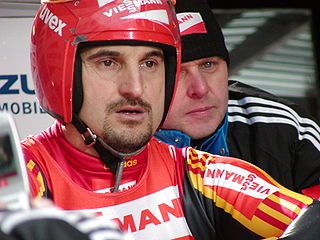
Georg Hackl is a German former luger who was three time Olympic and World Champion. He is known affectionately as Hackl-Schorsch or as the Speeding Weißwurst a reference to what he looks like in his white bodysuit coming down the luge at fast speeds.

Street luge is an extreme gravity-powered activity that involves riding a street luge board down a paved road or course. Street luge is also known as land luge or road luge. Like skateboarding, street luge is often done for sport and for recreation.

Sylke Otto is a former German luger who competed from 1991 to 2007. Competing in three Winter Olympics, she won the gold medal in the women's singles event in 2002 and 2006.

Armin Zöggeler OMRI is a retired Italian luger and double Olympic champion. He is one of the most successful men in the sport, nicknamed Il Cannibale, for his notable series of victories, or The Iceblood Champion, for his always cold, rational approach to the races. Fellow luger Tucker West described Zöggeler as the sport's equivalent of Michael Jordan.
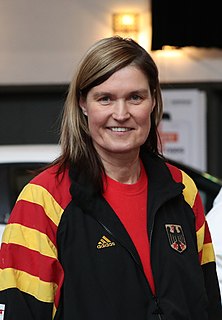
Silke Kraushaar-Pielach is a German luger who competed from 1995 to 2008. In June 2008, she was named sports manager for the luge section of Bob- und Schlittenverband für Deutschland.

Tatjana Hüfner is a German retired luger who has competed since 2003.

Alexander Resch is a German luger who competed from 1998 to 2010. Together with Patric Leitner, he won the men's doubles event at the 2002 Winter Olympics in Salt Lake City, United States. They also competed at the 2006 Winter Olympics, finishing sixth. At their last race at the 2010 Winter Olympics in Vancouver, they won bronze.
Norbert Huber is an Italian luger who competed from the early 1980s to the late 1990s.

The FIL World Luge Championships, part of the International Luge Federation (FIL) have taken place on an almost annual basis in non-Winter Olympics years since 1955. These championships are shown for artificial tracks. See FIL World Luge Natural Track Championships for all natural track events that have taken place since 1979.

Markus Prock is an Austrian luger who competed between 1983 and 2002. Born in Innsbruck, Prock competed in six Winter Olympics winning three medals in the men's singles event with two silvers and one bronze (2002).

The International Luge Federation is the main international federation for all luge sports. Founded by 13 nations at Davos, Switzerland in 1957, it has members of 53 national luge associations as of 2009 and is based in Berchtesgaden, Germany.
Paul Hildgartner is an Italian luger who competed from the early 1970s to the late 1980s. Competing in five Winter Olympics, he earned two gold medals and one silver medal for his efforts. At the 1984 Winter Olympics, Hildgartner carried the Italian flag during the opening ceremonies.
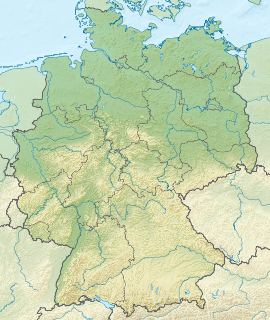
The Altenberg bobsleigh, luge, and skeleton track is a venue in Germany for bobsleigh, luge, and skeleton. Located in Saxony in eastern Germany, it is northwest of Altenberg, near the border with the Czech Republic.

The Königssee bobsleigh, luge, and skeleton track is a venue in Germany for bobsleigh, luge and skeleton, located in Schönau am Königssee, Bavaria, near Königssee and the border with Austria. Completed 53 years ago in 1968, it is the first permanent, artificially refrigerated bobsleigh, luge, and skeleton track in the world. In July 2021, the track was severely damaged by the floods that affected the European continent.
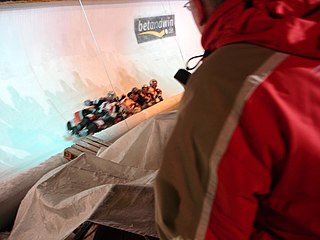
The Olympic Sliding Centre Innsbruck is a venue for bobsleigh, luge and skeleton located in Igls, Austria. The most recent version of the track was completed in 1975 and is the first permanent, combination artificially refrigerated bobsleigh, luge, and skeleton track, serving as a model for other tracks of its kind worldwide. It hosted the bobsleigh, luge, and skeleton competitions for the 2012 Winter Youth Olympics.
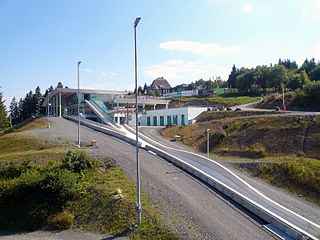
The Winterberg bobsleigh, luge, and skeleton track is a bobsleigh, luge, and skeleton track located in Winterberg, Germany. It is the only track of its kind in the world with a turn that has corporate sponsorship with turn seven being sponsored by Veltins, a German brewery which has its headquarters located in neighboring Meschede.
The Luge World Cup season is a yearly competition first organized by the International Luge Federation since 1977–78. The World Cup is the highest level season-long competition in the sport.
The 2009–10 Luge World Cup was a multi race tournament over a season for luge. The season started 17 November 2009 in Calgary, Canada and ended 31 January 2010 in Cesana, Italy. The World Cup was organised by the FIL and sponsored by Viessmann. This cup served as qualifiers up to 31 December 2009 for the 2010 Winter Olympics luge events in Vancouver.
The 2013–14 Luge World Cup was a multi race tournament over a season for luge organised by the FIL. The season started on 16 November 2013 in Lillehammer, Norway and ended on 26 January 2014 in Sigulda, Latvia. After the World Cup, the athletes moved for two weeks to Sochi for the Luge event in the XXII Olympic Winter Games.













